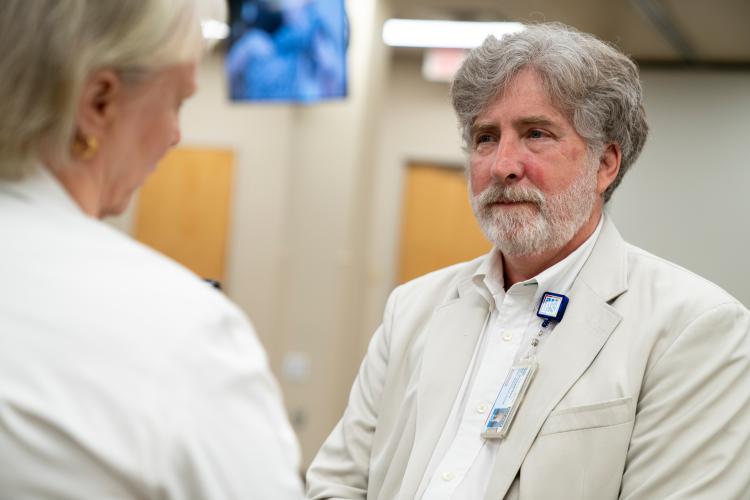
COVID-19 doesn’t only effect the lungs and hearts of the people it touches, the virus also deeply effects their minds and emotions.
Dr. Alan Podawiltz, Chairman of Behavioral Health at JPS, said the demand for mental health care has increased dramatically over the past nine months as COVID-19 has spread in our community and around the world.
“There has been more than a 30% increase for our JPS outpatient services,” Podawiltz said of the Behavioral Health caregivers at JPS. “Outpatient Services have been inundated with anxiety and depression treatment requests. On the inpatient side, from our Psychiatric Consult/Liaison service to our acute inpatient psychiatric service we have seen an increase in depression with suicidal thoughts and suicide attempts. We have also seen an increase of people with chronic mental illnesses needing hospitalization due to several factors including increased stress, anxiety and depression as well the patients not actively refilling their medications.
In addition to problems caused by COVID-related stress, the virus has created issues for people because of logistical reasons, Podawiltz said.
“Patients not refilling their medications can be attributed to transportation, fear of being in the public, and not having the financial resources to purchase the medications,” according to Podawiltz. “There are an infinite number of life experiences during our COVID-19 era.”
Ways COVID-19 triggers mental illness:
-
Quarantine - resulting in the lack of social contact creating an increased sense of loneliness and significant loss of control over one’s life and activities.
-
Financial Stress – from either loss of employment, the lost opportunity for employment, reduction of work hours per week, having to prioritize care for an ill family member over working, increased prices for essential items with no change in income, the fear that their financial security is always at risk
-
Fear of the illness itself – one cannot avoid some report from someone or the news media that reminds everyone about the catastrophic loss of life and the projections that it will get worse. As the pandemic has evolved over the last 12 months in the US I would say every person has had personal experiences with the illness. This could range from school children being sent home for quarantine to knowing personally someone has passed away or knowing someone who knows someone that has passed away. Fear and worry of acquiring this illness all too real.
-
Self-esteem damages – many persons are proud of the fact that they have been self-sufficient and always took care of their family needs. Now they are relying heavily on social support programs and food lines. This loss of independence and constant worry about where the next meal or essential support may come from wears on primary care givers.
-
Alcohol and substance abuse – there have been numerous cases where persons once sober have relapsed on their drug of choice.
“I am always trying find a silver lining from every situation,” and COVID-19 is no different, Podawiltz said. “Early in the pandemic, most people’s response was reactive. At JPS, we had to reshape and reprioritize our crisis response plans at a whole new level. There was an amazing amount of positive outcome with what will be long-lasting changes to our systems.”
The result is a number of new ways for Behavioral Health patients to connect with their caregivers to get the help they need. They include telehealth visits which allow patients to meet with their physicians over the phone or internet from the safety of their own home.
Caregivers also developed a strategy for In-patient delivery of services to COVID units where they needed to assess and treat patients in a quarantined area. Laptop computers were employed extensively and have become the routine response to COVID-positive units.
While it was tough to adapt to the COVID-19 crisis, Podawiltz said JPS instantly pulled together to respond to the situation and become the behavioral health resource Tarrant County needed.
“The illnesses we treat are chronic and need routine follow-up,” Podawiltz said. “With over 25,000 patients telehealth became the only strategy to provide those individuals with care. Early in the pandemic we did not have the number of cameras and microphones needed to outfit every provider. Administration prioritized the purchase of this need. We now have a technically solid tele-psychiatry service and are better prepared than ever to meet our patients’ needs.”
